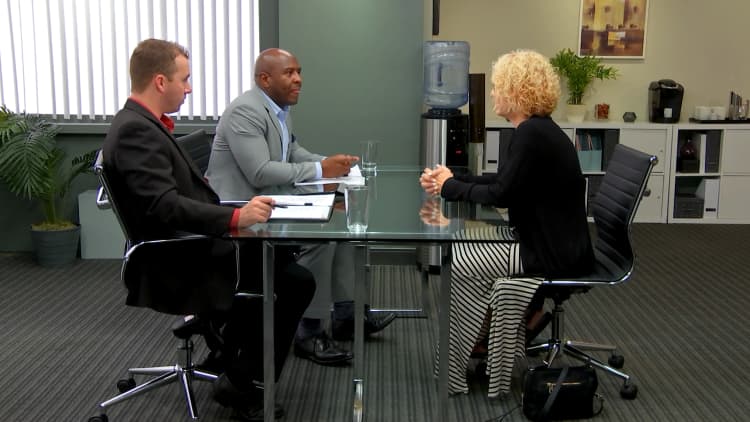Failure is never an easy feeling to cope with. Even the idea of being defeated can leave a bad taste in a person's mouth — making anyone hesitant to undertake risks.
Yet some of the world's most successful people have dealt with failure and while each person's experience may differ, many understand that if you learn from your mistakes, it can make you stronger.
Just take it from these guys:
Richard Branson
Today, Richard Branson may be flying high with his multinational conglomerate Virgin Group, yet that's not to say business wasn't "topsy-turvy" as it was gaining ground.
"The first fifteen years of Virgin Atlantic had been a topsy-turvy tale of excitement, innovation and survival," the Virgin Group founder wrote Tuesday, debuting an excerpt from his autobiography.
After taking on British Airways in a libel case which the billionaire described as part of a "challenging" period, Branson had the opportunity to explore new prospects for his brand. Since Virgin's inception in the 1970s, the group has seen a number of businesses emerge — many of which thrived.
Not every business idea lived to tell the tale today, however, with Branson citing Virgin Cars and Virgin Clothing as examples. Yet the billionaire admits that these "failures didn't put me off at all. They had all been fun to get stuck into, and we'd learned a lot of important lessons."
"If the odd business didn't work out, I was confident there would be another on the way," Branson wrote, adding that the brand wasn't derailed by smaller failures, as core firms remained robust.
"We were beginning to see which core areas we could expand the brand into, but it was still taking time for me to understand how flexible the Virgin brand was, the areas it could bend successfully, and the areas it would break."
"We were still a long way from creating the more structured strategy we have today, but it was one hell of a ride finding out what worked."
Christine Lagarde
She's seen as one of the most powerful women in the world today, yet International Monetary Fund (IMF) Manager Director Christine Lagarde didn't always have as much success.
At a young age, Lagarde wanted to have a career in the senior civil service, so she applied for a place at Ecole Nationale d'Administration (ENA), a prestigious French college.
Yet after failing to get in on reportedly more than one occasion, Lagarde joined Baker & McKenzie as an associate. In an episode of "Life Hacks Live", the IMF boss told CNBC that if she had ended up pursuing a career in civil service, it "might have been very boring".
"I was ashamed (that I didn't get into ENA), but then I decided to just take it in and move on to something different," said Lagarde.
"There is a period of time for regretting and very soon you have to get out of that moment and look at this strength, and just get on with it. And do something different."
Trinny Woodall
In the 2000s, Trinny Woodall was renowned for her fashion and makeover expertise, helped by her co-presenting role on the "What Not to Wear" U.K. television series. Fast forward and the advisor has transformed herself into a social media icon and founder of versatile makeup brand "Trinny London".
However it wasn't always easy for Woodall, who told "Life Hacks Live" how she dealt with difficult conversations with potential investors, lived in rentals and kept herself funded at times by selling her clothes.
In fact, Woodall explained that "failure is important because it's the only time I really learn" — seeing each challenge as a learning curve. And the same goes for taking risks.
"We have to look for opportunities and sometimes you think 'Where can that opportunity be?' But what I've learnt is that we never know when the door's going to open," Woodall said.
She added that the best advice she'd received was "99 percent of everything that you worry about, never happens."
Heston Blumenthal
He may be one of the world's most renowned celebrity chefs, yet to become a multi award-winning Michelin-star chef, Heston Blumenthal is likely to have dealt with a number of life challenges to succeed in the profession he now works in.
In a recent interview with Esquire, the British chef said that it was important for people "to embrace failure" as it provides us with "an opportunity to learn".
"There's one car manufacturer in Japan where if something goes wrong on the production line, there's a siren and a light above the station of the person where the mistake happened," Blumenthal was quoted saying in a recent U.K. issue of the magazine.
"Everyone downs tools and they all go over to this person. You're thinking, 'Oh, this is terrible', but in fact, they then cheer. Because that's being human, and now they can learn from it."
On a personal note, Blumenthal added that one of his greatest achievements is the work he's done on himself; describing how he'd managed to turn around "some fairly strong memories and experiences" that he'd attached negative connotations to— highlighting the power of learning from tough situations.
Like this story? Like CNBC Make It on Facebook.
Don't miss:
6 things great leaders do differently
How Richard Branson's mother turned the entrepreneur into an adventurer from a very early age
8 things to do before 8 a.m. to help you become wealthy and successful



